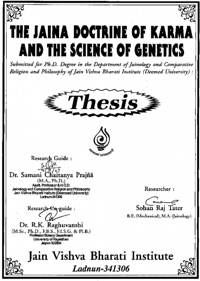One of the central problems in understanding the genetics of the immune system has been in explaining the genetic regulation of antibody production. Immunobiologists have demonstrated that the system can produce well over 1,00,000 specific antibodies, each corresponding to a particular antigen. It would be difficult to envisage that each antibody is encoded by a separate gene - such an arrangement would require a disproportionate share of the entire human genome. Recombinant DNA analysis has illustrated the mechanisms by which a limited number of immunoglobulin genes can encode this vast number of antibodies. [55]
The Jaina Doctrine of Karma And The Science Of Genetics: Early Dignosis And Treatment - The Genetics Of Antibody Formation
Author:
 Prof. Dr. Sohan Raj Tater
Prof. Dr. Sohan Raj Tater
 Prof. Dr. Sohan Raj Tater
Prof. Dr. Sohan Raj Tater
Published: 05.10.2009
 Doctoral Thesis, JVBU
Doctoral Thesis, JVBU